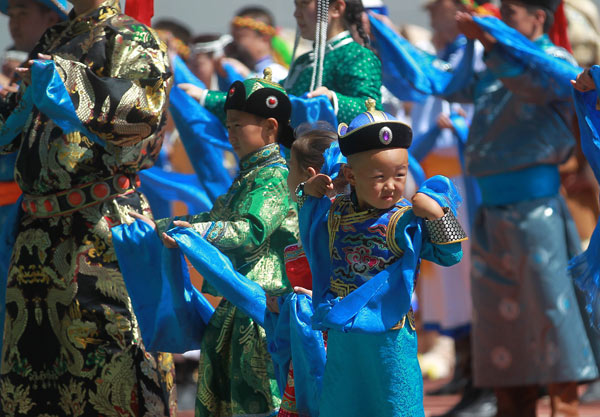One-time nomads hang on to traditional celebrations
Updated: 2013-08-28 07:35
By Zhang Yuchen in Xilinhot, Inner Mongolia, and Yang Fang in Hohhot (China Daily)
|
|||||||||||
 |
|
Young people always enjoy the Nadaam festivals. |
Traditionally, Mongolian wrestling has been the preserve of men but, in 1984, a women's division was established and they were allowed to participate for the first time. Although the inclusion of women was originally seen as an insult to the men, people seem to have grown accustomed to the sight of female wrestlers.
Nashun Chaogtu, has 20 years' experience of the sport. He said that since the age of 17, he has witnessed a great many changes. However, having made that cryptic remark, he declined to make further comment.
In the past five or six years, Mongolian wrestling has attracted a wider audience and the sums of money involved are now huge by local standards. On average, a professional bokh qin can earn about 400,000 yuan ($65,000) a year. During spring and summer they take part in competitions, and during autumn and winter they train at professional, private clubs.
In traditional bokh, a wrestler loses the bout when any part of their body above the knee touches the ground. The sport requires good waist and leg coordination and a wrestler is expected to present a full display of strength and skill during the bout.
But the sport is changing too. Some bouts at higher or professional level are limited to a duration of 60 minutes. Moreover, to aid the development of bokh, weight divisions will also be introduced at a future, unspecified date, said Borjigen Chogtu, a senior researcher at the Professional Bokh League Institution.
The move will be the latest in a series of amendments to the sport; since 1982, the rules have been reviewed and modified four times.
Atsag, a civil servant in Xilin Gol League, was encouraged to enter a bokh after his work unit offered a first prize of 40,000 yuan for the winner. However, Atsag refused to allow his only daughter to take part.
A slight weakening of attachment to traditional culture may be the result of many families moving to the urban areas, but many in the ethnic group are convinced that the old ways will be maintained for many years to come.
"The Nadaam, along with Mongolian wrestling, is rooted in the grassland culture and is prospering - no matter what happens, it will last forever," said Borjigen Chogtu.
Wang Kaihao and Yuan Hui contributed to this story.
Contact the writer at zhangyuchen@chinadaily.com.cn
Related Stories
Expert calls for adjusting investment mode in Mongolia 2013-08-23 21:13
19 killed in N China rainstorms 2013-08-23 11:41
Mongolia in the making: Chinese investment there 2013-08-16 10:41
Ethnic costumes tournament held in Inner Mongolia 2013-08-10 10:23
Aviation festival to be held in N China 2013-07-26 13:54
Ancient Xanadu still amazes 2013-07-21 09:35
Today's Top News
Sino-Japanese meeting at G20 ruled out
Japan coast guard seeks more money
Party's plenum to focus on reform
Industrial sector's profit picture brightens
Rich Chinese eye overseas properties
New time limits for visa processing
China joins global effort to combat tax evasion
Chinese negotiator in DPRK
Hot Topics
Lunar probe , China growth forecasts, Emission rules get tougher, China seen through 'colored lens', International board,
Editor's Picks

|

|

|

|

|

|





